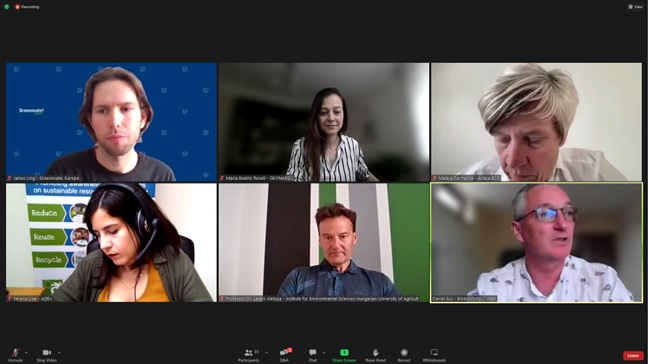James Ling from Greenovate! Europe introduced the webinar and the SCALIBUR project itself. The project is funded by the European Union’s Horizon 2020 Program and includes 21 partners from 8 countries. The project aims to develop and improve scalable technologies for bio-urban waste recovery.
Dr László Aleksza from the Institute for Environmental Sciences, Hungarian University of Agriculture and Life Sciences (MATE) presented initiatives on biowaste and biowaste management in Hungary. Although the transition from a linear to a circular economy is ongoing in Hungary, when it comes to waste management the amount of municipal sewage waste (MSW) that ends up in landfills, however, is still around 50% (around 25% higher than the EU average). He highlighted that fortunately the amount of MSW ending up in landfills is steadily decreasing throughout the years as a result of related laws and regulations. Instead, MSW is increasingly recycled and the yearly 1.5 million tons of biowaste (kitchen and green waste) potential is harnessed either via composting or incineration (waste-to-energy). He introduced the MATE Circular Economy research and development priorities which include aerobic treatment and the use of biowaste compost as organic fertilizer, anaerobic treatment and the production of biomethane, phosphorous recovery, second-generation biofuels, biodegradable polymers, thermochemical treatments and finally animal feed production.
Mateja Dermastia representing Anteja-ECG introduced the bioeconomy initiatives from Slovenia. She stressed the mounting pressure on firms due to value chain distributions (increasing energy prices and input and market loss), the target set by the European Green Deal (55% decrease in greenhouse gases by 2030 and climate neutrality by 2050) and finally due to proper reporting (supply chain due diligence and the corporate sustainability reporting directive). She emphasized that in Slovenia adopting a circular business model is a fundamental challenge for small and medium-sized enterprises (SMEs). She argued that this issue could be solved by strengthening the relationship with suppliers, multi-source supplies, shortening value chains, adopting digital solutions and more. As a potential solution, she introduced a value chain generator tool (vcg.ai) that aims to locate cross-regional and cross-sectoral supply chain opportunities for those wishing to transition toward a circular bioeconomy. The tool finds sustainable input suppliers and detects the best market opportunities for any given company’s products, residuals and waste.
The next presenter was Daniel Ács from Slovakia representing the Slovakian Bioeconomy Cluster. Slovakia currently has no national bioeconomy strategy. He argued that this is due to a lack of interest both in farmers and policymakers, lack of capacity, lack of cooperation, lack of space, a lack of common understanding of what bioeconomy actually and more. He pointed out that there is an urgent need for inter-ministerial dialogue on the matter in order begin a transition towards a bioeconomy in Slovakia. The Bioeconomy Cluster he represents supports local SMEs and provides advisory services, innovation projects and schemes, investment opportunities and a way of internationalization (consulting, training and missions) for those interested. Apart from their research and development areas the importance of education and training as of great potential was pointed out.
Serena Lisai from the Association of Cities and Regions for sustainable management (ACR+) introduced the HOOP network and shared solutions among cities and regions. The HOOP network currently consisting of 35 members can facilitate the connection among cities and regions facing the same urban challenges in terms of biowaste and wastewater and can inspire innovative solutions to make bio-based products. Organizations, companies, municipalities, and regional authorities that plan, organize or operate municipal waste management or wastewater treatment and wish to improve the local and regional bioeconomy are encouraged to join the network. The HOOP project provides services to its members such as the Urban Circular Bioeconomy Hub (UCBH), a circularity label, project activities, a virtual academy and monthly HOOP lunch talks.
In a final presentation, María Beatriz Rosell from Geonardo introduced our activities and the SCALIBUR E-learning Platform. The e-learning platform created by Geonardo is part of the exploitation and capacity building activities of the SCALIBUR project to help ensure Europe-wide replication and deployment of urban biowaste management strategies. The e-learning platform features online courses divided into two training modules targeted at two different stakeholders: municipalities and local/regional waste managers and companies and SMEs who wish to enter the urban circular bioeconomy domain. The SCALIBUR e-learning platform is permanently available to those interested.
We encourage everyone to register and complete the training modules and to leave us feedback.
The SCALIBUR e-learning platform is available at: Scalibur ELearning (geonardo.com)
The SCALIBUR project website is available at: Scalibur – LEADING A REVOLUTION IN BIOWASTE RECYCLING
